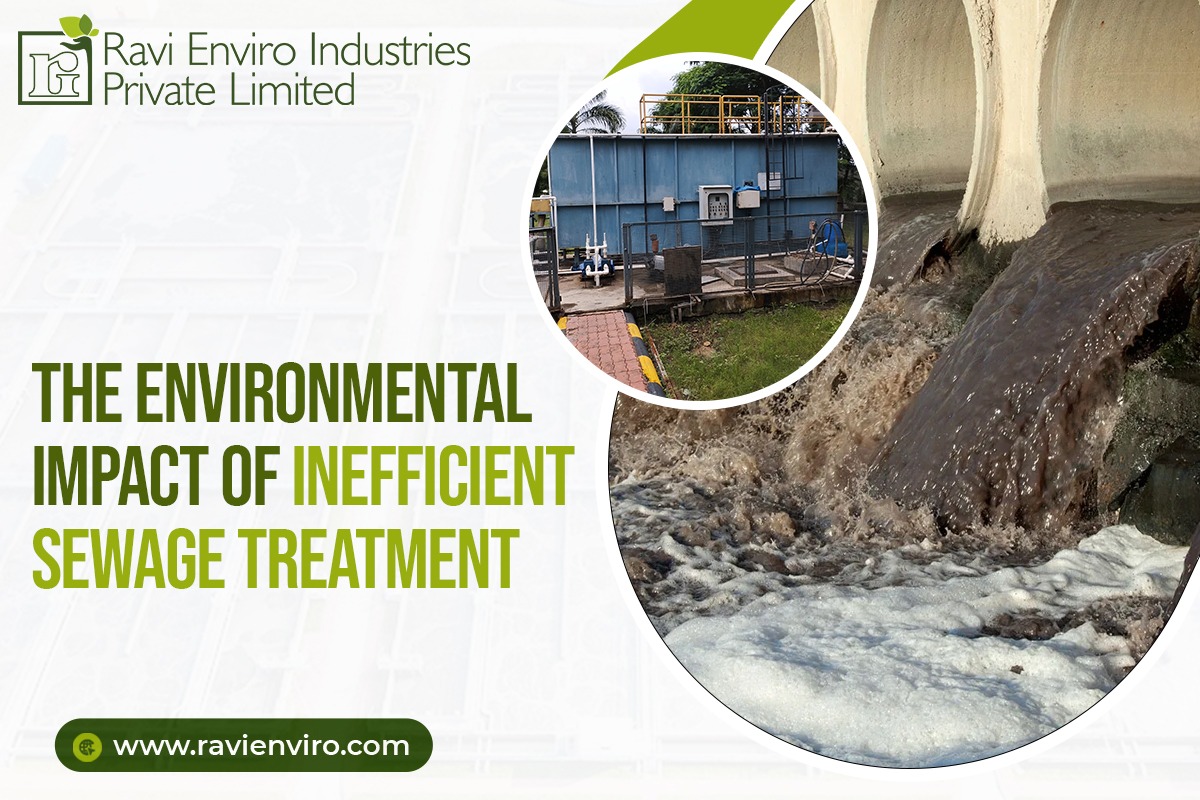
- Jun 16, 2025
- Ravi Enviro
- STP
- 0 Comments
Industrial, residential and commercial activities generate a large amount of sewage wastewater. Improper sewage treatment can lead to significant environmental impact, including soil contaminants, water and air pollution, as well as a threat to public health. In this, a sewage treatment plant (STP) plays a pivotal role in sewage treatment. STP plants help to remove impurities, contaminants and pollutants from wastewater, protecting the environment and promoting sustainable water management. However, an inefficient sewage treatment plant causes serious environmental and health concerns. This can be devastating for the residents living near the STP plant facility, the ecosystem and agricultural land. In this blog, we understand the environmental impact of an inefficient sewage treatment plant, highlighting the importance of efficient & fully functional STP plants.
Reasons Behind Inefficient Sewage Treatment Plants
- Outdated STP Technology: Many sewage treatment plants are designed & built with outdated technology without the consideration of future treatment requirements. A sophisticated sewage treatment plant has transformed wastewater treatment, designed to meet the growing demands of sewage treatment for different industries.
- Unskilled Manpower: Lack of well-trained operators and a maintenance team can lead to STP operation failure and mismanagement.
- STP Overloading: As mentioned above, STP systems are sometimes built without consideration of future needs. This leads to overloading of STP plants beyond their capacity and poorly treated wastewater.
- No Real-time Monitoring: Without Automation in STP systems and real-time monitoring can cause serious problems.
Public Health & Environmental Impact of Inefficient Sewage Treatment
Foul Odour
One of the main problems of an inefficient sewage treatment plant is the unbearable and persistent foul odour. When sewage wastewater is not treated properly due to inadequate biological activity, overloaded STP systems or poor aeration. The decomposition of organic components leads to strong foul-smelling odours that make it challenging for people residing nearby.
Public Health Hazards
A poorly functioning STP plant poses a major threat to public health. Pathogens, bacteria and viruses are spread easily and lead to the following issues:
- Respiratory problems like asthma, bronchitis, and waterborne diseases like dysentery, cholera, typhoid, hepatitis A and other major health issues.
- Mental disturbance due to unhygienic living conditions and prolonged exposure to foul conditions.
Soil Contamination and Water Pollution
An inefficient STP plant may discharge partially treated water into the water bodies or into the groundwater. This can cause:
- Water Pollution: Untreated sewage water is released into rivers, ponds and lakes that can contaminate the water bodies and impact marine life.
- Contaminated Groundwater: Faulty STP plants can seep oils and grease, pathogens, nitrate and phosphates into the groundwater, impacting the fresh water resources.
Pest Infestation
Untreated wastewater from residential and commercial establishments can lead to sewage and sludge accumulation. This makes it challenging for residents nearby by causing problems like mosquito breeding, an increase in rodents & flies and pest infestation.
Upgrade Sewage Treatment Plants with Ravi Enviro Industries Pvt. Ltd
Upgrading your sewage treatment plant seems like a daunting task, but with the right STP manufacturers in India and their team, you can reduce costs, improve quality and have a long-term wastewater management system. So if you are looking to upgrade your STP system, REIPL can design sewage water treatment solutions that meet your needs. Contact us for inquiries.



